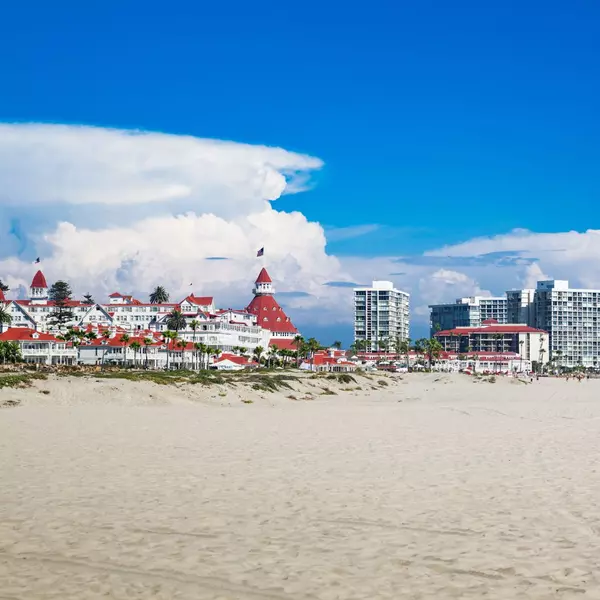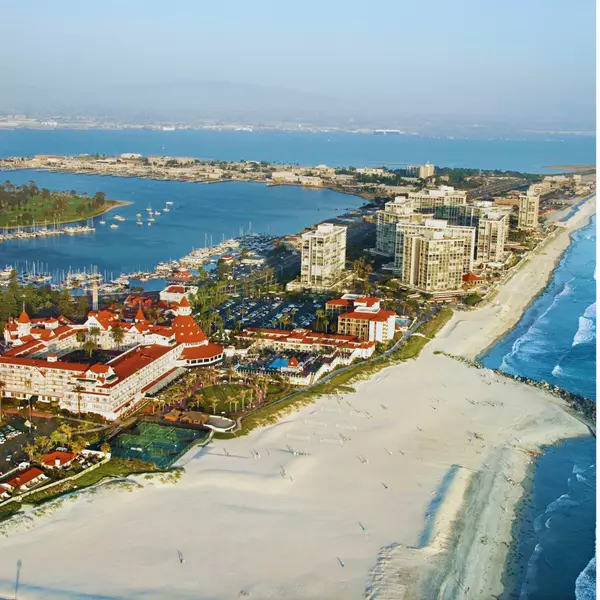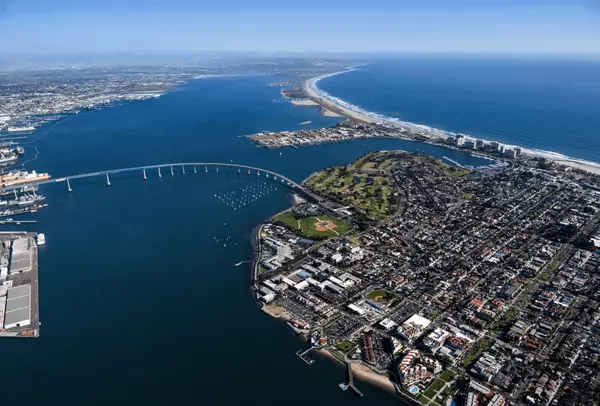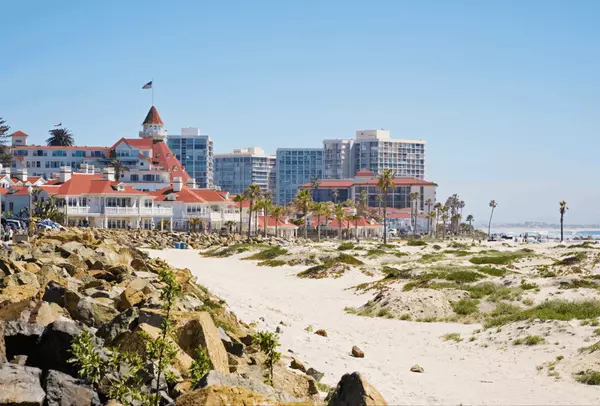

The History of The Hotel Del Coronado
Nestled along the sun-kissed shores of Coronado, California, stands a testament to timeless elegance and Victorian grandeur—the iconic Hotel del Coronado, affectionately known as "The Del." But this legendary establishment's story begins long before its red turrets graced the coastline. The Visionaries Behind The Del In the late 19th century, Coronado was already gaining a reputation as a paradise with its golden beaches and idyllic climate. It was against this backdrop that the visionaries Elisha Babcock Jr. and Hampton L. Story saw an opportunity to create something extraordinary. Babcock and Story, mesmerized by the area's natural beauty, envisioned a grand resort that would capture the hearts of travelers far and wide. Their dream? A place where luxury met leisure, where opulence mingled with ocean breezes—a place that would become The Del. The Architectural Marvel To bring their vision to life, they turned to the brilliant architect James W. Reid. Working with Reid, the plans for The Del took shape—a sprawling wooden Victorian masterpiece that would redefine luxury hospitality. Construction of The Del was a monumental undertaking. Thousands of redwood timbers were transported from the forests of Northern California, each one a piece of the hotel's storied history. Over 2,000 skilled craftsmen and laborers poured their sweat and dedication into every detail, ensuring that The Del would be nothing short of spectacular. The Grand Opening Finally, on a historic day in February 1888, The Del opened its doors to the world. Guests marveled at its towering spires, elegant architecture, and sweeping views of the Pacific Ocean. The hotel was an instant sensation, drawing in travelers, dignitaries, and celebrities alike. A Playground for the Rich and Famous From its earliest days, The Del became a magnet for the elite. Hollywood stars, wealthy socialites, and even European royalty flocked to its luxurious accommodations and world-class amenities. The hotel's reputation as a playground for the rich and famous was solidified, earning it a place in the annals of history. A Vital Part of Coronado's Heritage But The Del wasn't just a place of leisure—it played a vital role in shaping Coronado's identity. During World War II, the hotel was transformed into a bustling naval training center, where thousands of young recruits received their basic training. The halls that once echoed with laughter and music now reverberated with the cadence of military drills, adding a new chapter to The Del's storied past. Enduring Elegance Through the Years Over the decades, The Del has undergone changes and renovations, each one carefully preserving its timeless elegance while embracing modern comforts. The iconic red turrets still stand tall against the ocean backdrop, a beacon of luxury and sophistication. Timeless Architecture and Intriguing Legends Stepping into The Del is like stepping back in time. The lobby, with its soaring ceilings and ornate chandeliers, exudes old-world charm. The legendary Crown Room, adorned with its crown-shaped chandeliers, has witnessed countless lavish events and weddings, earning its place as a cherished Coronado landmark. A Beachfront Oasis Outside, The Del's expansive beachfront beckons with its powdery sands and azure waters. Guests can lounge in the California sun, take a refreshing dip in the Pacific, or sip cocktails by the water's edge. The Del's beachfront remains a coveted spot for relaxation and recreation, a true oasis by the sea. The Del Today: A Living Legend Today, The Del stands as a living legend, a testament to the vision of its founders and the enduring allure of Coronado. Whether you're a history buff, a lover of luxury, or simply seeking a beachside escape, The Del offers an unforgettable experience. A Gem of the California Coast As the sun sets in a blaze of golden hues over The Del, it's easy to see why this historic hotel continues to captivate hearts and imaginations. Its rich history, timeless architecture, and stunning ocean views make it a must-visit destination for travelers from around the world. Conclusion: A Legacy of Luxury In the heart of Coronado, where the Pacific meets perfection, The Del stands as a beacon of luxury and elegance. Its story is one of vision, dedication, and enduring charm—a legacy that continues to enchant guests and visitors alike. So, the next time you find yourself on the California coast, make sure to step into history at the magnificent Hotel del Coronado.
Read More

Coronado Island Rich in History
Situated just off the coast of San Diego, California, this picturesque island has a captivating story that spans centuries. From its early indigenous inhabitants to its development as a bustling resort community, Coronado Island has evolved through various stages of exploration, colonization, and modernization. Join us on a journey through time as we delve into the fascinating history of Coronado, shedding light on its cultural, economic, and environmental heritage. Prehistory of Coronado Island Long before the arrival of European explorers, Coronado Island was home to indigenous peoples who thrived in harmony with the land and sea. Archaeological evidence suggests that the Kumeyaay, a Native American tribe, inhabited the region for thousands of years, relying on fishing, hunting, and gathering for sustenance. Their legacy endures in the form of ancient artifacts and sacred sites scattered across the island, serving as a testament to their enduring presence. Early Explorers and Spanish Influence The first European to set foot on Coronado Island was the Spanish explorer Juan Rodríguez Cabrillo, who arrived in 1542 during his expedition along the California coastline. However, it was not until the late 18th century that Spanish missionaries began to establish a more permanent presence in the region, seeking to convert the indigenous population to Christianity. The construction of Mission San Diego de Alcalá in 1769 marked the beginning of Spanish colonization in California, laying the foundation for subsequent waves of European settlement. Mexican Era and the Treaty of Guadalupe Hidalgo Following Mexico's independence from Spain in 1821, Coronado Island fell under Mexican sovereignty as part of Alta California. During this period, the island remained sparsely populated, primarily serving as grazing land for cattle and sheep. However, the Mexican-American War of 1846-1848 would dramatically alter the island's fate, culminating in the signing of the Treaty of Guadalupe Hidalgo, which ceded California to the United States. Coronado Island in the American Period With the influx of American settlers during the mid-19th century, Coronado Island experienced a period of rapid transformation and development. The discovery of gold in California sparked a wave of migration to the West Coast, prompting entrepreneurs and investors to capitalize on the region's economic potential. Coronado's strategic location and natural beauty soon attracted attention, leading to the establishment of the first commercial ventures and residential communities on the island. Development Boom: 19th Century to Early 20th Century The late 19th and early 20th centuries witnessed a surge in development activity on Coronado Island, fueled by advancements in transportation and infrastructure. The completion of the San Diego-Coronado Bridge in 1969 further facilitated access to the island, paving the way for increased tourism and commerce. Today, Coronado remains a thriving hub of activity, boasting a vibrant mix of residential neighborhoods, luxury resorts, and cultural attractions. Military Presence and Naval History One of the defining features of Coronado Island's history is its close ties to the United States military. Beginning in the late 19th century, the island served as a strategic outpost for the U.S. Navy, hosting various naval installations and training facilities. Naval Air Station North Island, established in 1917, played a crucial role during World War II and continues to operate as a key base for naval aviation operations. Coronado Island During World War II The outbreak of World War II had a profound impact on Coronado Island, transforming it into a bustling military hub and training center for Allied forces. The construction of naval facilities, such as the Naval Amphibious Base Coronado and the Naval Air Station, brought an influx of servicemen and their families to the island, stimulating economic growth and shaping its wartime identity. Postwar Era: Growth and Modernization Following the end of World War II, Coronado Island experienced a period of postwar prosperity and expansion, fueled by the return of veterans and the burgeoning tourism industry. The construction of iconic landmarks, such as the Hotel del Coronado and the Coronado Shores development, cemented the island's reputation as a premier destination for leisure and recreation. Tourism and Leisure on Coronado Island Today, Coronado Island continues to attract visitors from around the world with its pristine beaches, charming downtown area, and rich cultural heritage. Whether strolling along the iconic Orange Avenue or soaking up the sun at Coronado Beach, tourists can experience a diverse array of attractions and activities that showcase the island's unique blend of history and modernity. Cultural and Architectural Heritage From its historic Victorian-era mansions to its Spanish Colonial Revival-style buildings, Coronado Island boasts a wealth of architectural treasures that reflect its multicultural heritage. The iconic Hotel del Coronado, affectionately known as "The Del," stands as a testament to the island's Gilded Age glamour and continues to captivate visitors with its timeless elegance and charm. Environmental Conservation Efforts In recent years, Coronado Island has emerged as a leader in environmental conservation and sustainable development initiatives. Organizations such as the Coronado Environmental Council and the Friends of the Coronado Historic Site are dedicated to preserving the island's natural beauty and cultural legacy for future generations to enjoy. Contemporary Coronado: Residential and Commercial Development As Coronado Island enters the 21st century, it faces a new set of challenges and opportunities in terms of residential and commercial development. With limited land available for expansion, the island must strike a delicate balance between preserving its small-town charm and accommodating the needs of a growing population. Future Prospects and Challenges Looking ahead, Coronado Island is poised to continue its legacy as a premier destination for residents and tourists alike. However, challenges such as rising sea levels, affordable housing shortages, and infrastructure constraints must be addressed to ensure the island's long-term sustainability and resilience. The history of Coronado Island is a testament to the enduring spirit of exploration, innovation, and resilience that has shaped its identity over the centuries. From its ancient indigenous roots to its modern-day allure, Coronado remains a beacon of beauty and inspiration for all who are fortunate enough to experience its wonders. As we celebrate the island's rich heritage, let us also embrace the responsibility of stewardship and preservation, ensuring that Coronado continues to thrive for generations to come.
Read More

The Impact of Home Staging in Coronado Real Estate
In the competitive real estate market of Coronado, the value of home staging cannot be overstated. Research-backed data points underscore the significant impact that staging can have on a property's market appeal, ultimately leading to faster sales and higher selling prices. Faster Sales Timeline According to a study conducted by the Real Estate Staging Association (RESA), homes that are professionally staged in Coronado tend to sell faster than their non-staged counterparts. The data indicates that staged homes spend significantly fewer days on the market, highlighting the efficiency of the staging process in attracting potential buyers and expediting the sales timeline. Higher Perceived Value Research from the National Association of Realtors (NAR) reveals that staged homes in Coronado are often perceived as having a higher market value by potential buyers. The presentation of a well-staged home creates an atmosphere of desirability, influencing buyers to assign a greater value to the property. This heightened perceived value can contribute to a more favorable negotiating position for sellers, potentially leading to higher selling prices. Increased Buyer Visualization One of the key advantages of home staging, as highlighted by a survey conducted by the International Association of Home Staging Professionals (IAHSP), is its ability to help buyers visualize the potential of a property. Staged homes in Coronado provide a clear and aesthetically pleasing representation of the living spaces, allowing potential buyers to envision themselves living in the home. This emotional connection often translates into a higher likelihood of making an offer. Enhanced Online Presence and Attraction In the digital age, the first impression of a property is often formed through online listings. According to data from the Real Estate Staging Association, professionally staged homes in Coronado receive more online views compared to non-staged homes. The visually appealing presentation of a staged home captivates online viewers, generating increased interest and inquiries. This heightened online presence can significantly contribute to attracting a larger pool of potential buyers. In Coronado's real estate market, the decision to stage your home is supported by compelling research-backed data. From expediting the sales timeline to influencing higher perceived values, home staging emerges as a strategic investment for sellers. The ability to enhance buyer visualization and attract a broader audience through an improved online presence further solidifies the value of this practice. As sellers navigate the competitive Coronado real estate landscape, incorporating professional home staging into their selling strategy can be a key factor in achieving a successful and lucrative transaction.
Read More
Categories
Recent Posts








CORONADO REAL ESTATE NEWS



